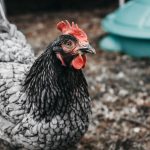As temperatures decrease, ensuring proper nutrition for chickens becomes crucial to maintain their warmth and health. Chickens, like humans, require a balanced diet to regulate body temperature and remain comfortable in cold conditions. Providing appropriate foods helps chickens generate the necessary energy to stay warm and active during winter months.
This article will examine various food options that contribute to keeping chickens warm, including nutritious grains and seeds, warming fruits and vegetables, protein-rich foods, and herbs and spices that aid in maintaining body heat. Additionally, it will address foods to avoid during cold weather to promote the overall health and well-being of chickens throughout the winter season.
Table of Contents
Key Takeaways
- Introducing foods that keep chickens warm can help ensure their health and comfort during cold weather.
- Nutritious grains and seeds like oats and sunflower seeds provide essential energy and warmth for chickens.
- Warming fruits and vegetables such as apples and carrots can be beneficial for keeping chickens warm in cold weather.
- Protein-rich foods like mealworms and soybeans are important for maintaining body heat in chickens.
- Herbs and spices like garlic and cinnamon can help chickens stay warm and boost their immune system.
- It’s important to avoid feeding chickens foods like raw potatoes and uncooked beans in cold weather to prevent digestive issues.
- By incorporating a balanced diet of warm and nutritious foods, chicken owners can help ensure their flock stays healthy and warm during colder months.
Nutritious Grains and Seeds for Chickens
Seeds: A Rich Source of Healthy Fats
In addition to grains, seeds such as sunflower seeds and flaxseeds are rich in healthy fats, which can help chickens maintain their body heat. By including a variety of grains and seeds in your chickens’ diet, you can ensure that they have the energy they need to stay warm and healthy during the winter months.
Nutrient-Rich Grains and Seeds
Grains and seeds also offer essential nutrients such as vitamins, minerals, and fiber. For example, oats are high in fiber, which can aid in digestion and keep chickens feeling full and satisfied. Meanwhile, sunflower seeds are a good source of vitamin E, which can support immune function and overall health.
A Balanced Diet for a Healthy Winter
By incorporating a mix of nutritious grains and seeds into your chickens’ diet, you can help them stay warm and well-nourished throughout the winter. A balanced diet that includes a variety of grains and seeds can ensure that your chickens remain healthy and thrive during the cold winter months.
Warming Fruits and Vegetables for Chickens

Fruits and vegetables are another important component of a balanced diet for chickens, especially in colder weather. Certain fruits and vegetables have warming properties that can help chickens maintain their body temperature. For example, root vegetables like carrots, beets, and sweet potatoes are high in carbohydrates and can provide a good source of energy for chickens.
Additionally, these vegetables are rich in vitamins and minerals that can support overall health and immunity. Fruits such as apples, berries, and bananas are also beneficial for chickens in cold weather. These fruits are high in natural sugars, which can provide a quick source of energy for chickens.
They also contain vitamins and antioxidants that can support immune function and help chickens stay healthy during the winter months. By including a variety of warming fruits and vegetables in your chickens’ diet, you can help them stay warm, energized, and well-nourished throughout the colder seasons.
Protein-Rich Foods to Keep Chickens Warm
Protein is an essential nutrient for chickens, especially in cold weather when they need extra energy to stay warm. Including protein-rich foods in their diet can help them maintain their body temperature and support overall health. Foods such as mealworms, earthworms, and crickets are excellent sources of protein for chickens.
These insects are not only high in protein but also contain essential amino acids that are important for muscle development and overall health. In addition to insects, other protein-rich foods such as soybeans, peas, and lentils can be beneficial for chickens in cold weather. These plant-based proteins are high in essential nutrients such as iron, zinc, and B vitamins, which can support energy production and immune function.
By incorporating a variety of protein-rich foods into your chickens’ diet, you can help them stay warm, active, and healthy throughout the winter months.
Herbs and Spices that Help Chickens Stay Warm
Certain herbs and spices have warming properties that can help chickens maintain their body heat during colder weather. For example, garlic is known for its natural warming effects and can be beneficial for chickens in cold weather. Adding small amounts of garlic to their diet can help improve circulation and keep them warm.
Additionally, ginger is another warming spice that can aid in digestion and support overall health for chickens. Herbs such as oregano, thyme, and basil also offer health benefits for chickens in cold weather. These herbs contain essential oils that have antibacterial and antiviral properties, which can support immune function and help chickens stay healthy during the winter months.
By incorporating a variety of herbs and spices into your chickens’ diet, you can help them stay warm, healthy, and well-nourished throughout the colder seasons.
Foods to Avoid in Cold Weather for Chickens

Food to Avoid in Cold Weather
While it’s essential to provide your chickens with the right foods to keep them warm during colder weather, it’s equally important to be mindful of foods to avoid. Certain foods can have a cooling effect on chickens’ bodies or may be difficult for them to digest in colder temperatures.
Foods with High Water Content
For example, watery fruits such as watermelon or cucumber should be given sparingly in cold weather as they can have a cooling effect on chickens’ bodies.
Foods that Strain Digestive Systems
Additionally, it’s important to avoid feeding chickens foods that are high in moisture content or difficult to digest, such as excessive amounts of greens or dairy products. These foods can put extra strain on chickens’ digestive systems during colder weather when their metabolism may already be slowed down.
Ensuring Chicken Health and Comfort
By being mindful of the foods to avoid in cold weather, you can ensure that your chickens stay warm, comfortable, and healthy throughout the winter months.
Creating a Balanced Diet for Warm and Healthy Chickens
In conclusion, providing your chickens with a balanced diet is essential for keeping them warm and healthy during colder weather. Nutritious grains and seeds offer a good source of energy, while warming fruits and vegetables provide essential nutrients to support overall health. Protein-rich foods are important for maintaining body temperature and muscle development, while herbs and spices can aid in digestion and support immune function.
By being mindful of the foods to avoid in cold weather, you can ensure that your chickens stay comfortable and well-nourished throughout the winter months. By incorporating a variety of these foods into your chickens’ diet, you can help them stay warm, active, and healthy all winter long. With the right nutrition, your chickens will be able to thrive even in the coldest of temperatures.
If you’re interested in learning more about keeping chickens warm, you might also want to check out this article on converting a shed to a chicken coop. It offers valuable tips and advice on creating a cozy and insulated space for your feathered friends to stay warm during the colder months.
FAQs
What are some foods that can help keep chickens warm?
Some foods that can help keep chickens warm include cracked corn, black oil sunflower seeds, and mealworms. These foods are high in fat and protein, which can help chickens generate heat and maintain their body temperature during cold weather.
How do these foods help keep chickens warm?
Foods high in fat and protein can help chickens generate heat through the process of digestion. When chickens digest these foods, their bodies produce more energy, which in turn helps them stay warm in cold temperatures.
Are there any other ways to keep chickens warm besides feeding them specific foods?
In addition to feeding chickens specific foods, other ways to keep them warm include providing a well-insulated coop, using heat lamps or heated waterers, and ensuring they have access to dry bedding. It’s also important to minimize drafts and keep the coop well-ventilated to prevent moisture buildup.
Can feeding chickens specific foods help prevent frostbite in cold weather?
Feeding chickens specific foods high in fat and protein can help prevent frostbite by helping them maintain their body temperature. However, it’s also important to provide a well-insulated and draft-free coop, as well as ensuring they have access to dry bedding and adequate ventilation.
Meet Walter, the feathered-friend fanatic of Florida! Nestled in the sunshine state, Walter struts through life with his feathered companions, clucking his way to happiness. With a coop that’s fancier than a five-star hotel, he’s the Don Juan of the chicken world. When he’s not teaching his hens to do the cha-cha, you’ll find him in a heated debate with his prized rooster, Sir Clucks-a-Lot. Walter’s poultry passion is no yolk; he’s the sunny-side-up guy you never knew you needed in your flock of friends!







